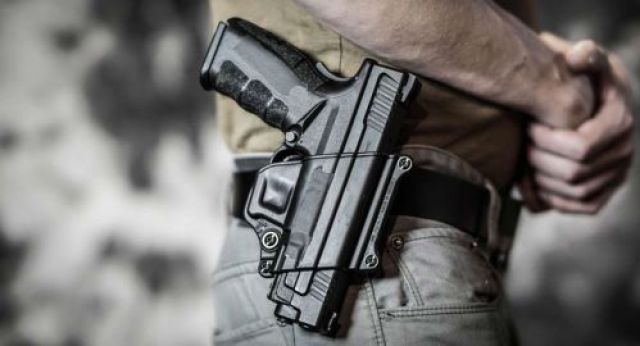In the heart of South Carolina, a revolutionary shift in gun laws unfolds, challenging the balance between freedom and safety.
The “Second Amendment Preservation Act” catapults the state into the spotlight, allowing citizens to openly carry handguns without a permit.
This from msn.com.

This bold move sparks a fiery debate on:
[R]ights, responsibilities, and
the ripple effects on community safety.
The “Second Amendment Preservation Act,” also known as “constitutional carry,” marks a significant shift in South Carolina’s gun laws. Signed by Governor Henry McMaster in a private ceremony, this law permits individuals aged 18 and over to carry handguns openly without the need for a permit.
- It’s a move that aligns South Carolina with 28 other states that have similar laws.
- This legislation is seen as an expansion of the Second Amendment rights for law-abiding.
A crucial aspect of the new law is its focus on curbing illegal gun possession and use.
- By introducing stiffer penalties for violations, the state aims to deter criminal activities involving firearms.
- This measure seeks to reassure the public that, despite the loosening of carry restrictions, the government remains committed to safety and law enforcement.
The legislation tightens the timeframe within which gun owners must report their stolen weapons.
- This change is intended to help law enforcement respond more swiftly to gun thefts, potentially reducing the number of illegally possessed firearms in circulation.
- It’s a measure that underscores the responsibilities accompanying gun ownership.
To address concerns about the potential risks of more citizens carrying guns without permits, the law includes provisions for state-paid firearms training classes. These classes aim to educate gun owners on safe handling and responsible ownership, an effort to mitigate accidents and enhance public safety.
Despite the permitless carry provision, the law maintains existing restrictions on firearms in certain locations, such as schools, courthouses, and the Statehouse.
- This stipulation is meant to balance the expansion of gun rights with the need to keep sensitive areas secure.
Interestingly, the law does not eliminate the option for South Carolinians to obtain a concealed weapons permit. This provision offers flexibility for residents who may wish to carry concealed firearms in states that recognize South Carolina’s permit through reciprocity agreements, extending the utility of legal gun ownership.
Proponents, including State Rep. Brandon Cox, argue that the bill not only upholds constitutional rights but also effectively addresses gun crime.
- They point to other states with similar laws that have not experienced an uptick in violence as evidence that permitless carry can coexist with public safety.
Critics of the law express concerns over the potential for increased gun violence and accidents, given that more people may carry firearms with less oversight.
- They argue that the removal of permit requirements could lead to situations where guns are carried by individuals not adequately trained in their use and safety.
The law enforcement community has shown mixed reactions.
- Some officers welcome the stricter penalties for illegal gun use as a tool to combat crime, and
- [O]thers worry about the challenges of policing in an environment where more individuals are armed.
Analysts predict that the law may lead to an increase in gun ownership rates in South Carolina, as individuals who previously hesitated due to the permitting process might now choose to own and carry firearms.
- This potential rise in ownership highlights the importance of the included training provisions.
South Carolina’s move reflects a broader trend in the United States toward “constitutional carry” laws.
- As the 29th state to adopt such legislation, [South Caroline] contributes to a national dialogue about the balance between gun rights and public safety.
As the “Second Amendment Preservation Act” takes effect, both supporters and opponents will be closely monitoring its impact on crime rates, public safety, and gun ownership practices in South Carolina.
- This period of observation will be critical in evaluating the law’s long-term effects and may inform future legislative efforts in the state and beyond.
- As the dust settles on the passage of South Carolina’s ‘Second Amendment Preservation Act,’ the state navigates a new era of gun rights and responsibilities.
- This pivotal moment in history marks not just a change in legislation but a significant societal shift towards interpreting the balance between individual freedoms and collective safety.
Only time will reveal the true impact of this law on the community, law enforcement, and the fabric of South Carolina’s society.



